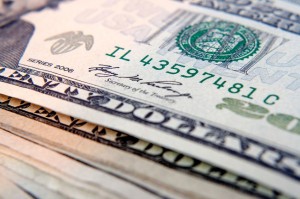Valuing Women: Will We See a Fresh Face on the Almighty Dollar?

“Rosa Parks.” “Gloria Steinem.” “Amelia Earhart.” “Margaret Stanger.” “My mother.” These were all answers given by attendees at the American Humanist Association’s annual conference in Denver earlier this month when I asked them, “What woman would you like to see on the $20 bill?” The most common answer was actually Eleanor Roosevelt. Since she was chair of the United Nations Commission on Human Rights that drafted the Universal Declaration of Human Rights, she was certainly an apt choice by a gathering of humanists.
At the Feminist Caucus table during the conference, I passed out cards inviting humanists to be part of a grassroots campaign to get a woman on the $20 bill. Two women have appeared on the federally minted dollar coin: Susan B. Anthony and Sacagawea. But no women have been on official US paper currency since it was established after the Civil War.
The grassroots effort, Womenon20s.org, chose the $20 bill because it features President Andrew Jackson who, while lauded for many accomplishments, is known for championing the Indian Removal Act of 1830 that resulted in the deaths and displacement of tens of thousands of Native Americans. He also despised the central bank and paper currency.
The first round of voting to select a woman to advocate putting on the $20 bill allowed participants to select from fifteen candidates: Alice Paul, Betty Friedan, Shirley Chisholm, Sojourner Truth, Rachel Carson, Rosa Parks, Barbara Jordan, Margaret Sanger, Patsy Mink, Clara Barton, Harriet Tubman, Frances Perkins, Susan B. Anthony, Eleanor Roosevelt, and Elizabeth Cady Stanton.
The final candidates were Eleanor Roosevelt, Harriet Tubman, Rosa Parks, and, because of strong public feelings that a Native American woman should be included to replace Jackson, Cherokee Nation Chief Wilma Mankiller, who was added in the second round of voting. The campaign ended on Mother’s Day and the winner was Harriet Tubman, the former slave, Underground Railroad leader, abolitionist, and suffragist.
It doesn’t take an act of Congress to change US currency; the president can direct the secretary of the US Treasury to do it. So the Womenon20s.org campaign wanted a petition with 100,000 virtual signatures (names and emails) asking President Obama do so. Instead, the campaign got more than half a million participants for the petition. Women received the constitutional right to vote in 1920; the 100th anniversary of that amendment is in five years. The goal of this campaign is to have a woman on the $20 before then.
Our money says something about who we are as a people. (And some would even argue that as capitalists we worship the “almighty dollar” above all else.) Other nations, including Syria, Turkey, Mexico, United Kingdom, Argentina, New Zealand, Israel, Sweden, Philippines, and Australia have all featured women on their currency.
If we expand our vision of who we are as a nation, as a people, to include women and minorities on the currency, perhaps we can also get Americans to remove the less-than-inclusive phrase “In God We Trust” from it. The phrase was added to our paper currency in the 1950s during the height of the Cold War. Making our currency more inclusive should also mean removing the parts that are exclusionary. After all, we don’t all trust God, or any god, and we are still Americans.
